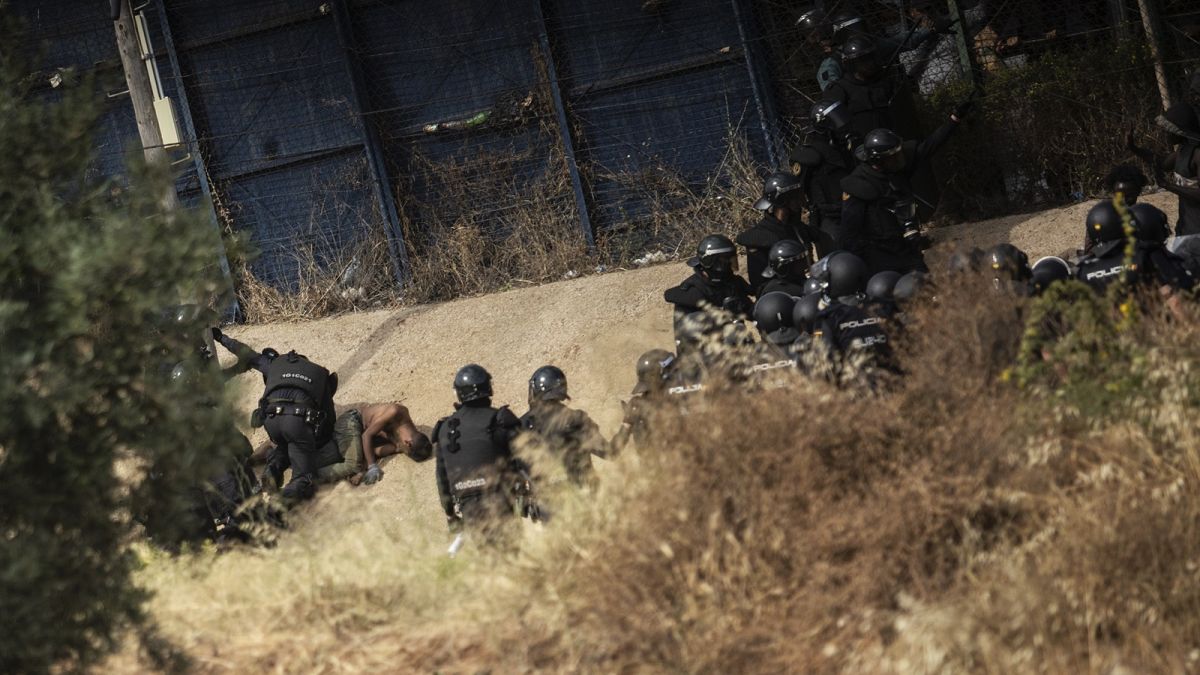MEPs, the African Union and an UN committee have demanded a prompt inquiry into the fatal border crossing.
Spain and Morocco are under the spotlight after a border crossing in the enclave of Melilla resulted in the death of at least 37 migrants, according to numbers provided by NGOs working on the ground.
International condemnation is growing against the two countries, as new details emerge about the massacre and the treatment by law enforcement.
Members of the European Parliament, the African Union and a special United Nations Committee are among the latest demanding a prompt inquiry to shed light over the tragedy.
Around 2,000 migrants attempted to cross the border on 24 June, a sudden influx that caused a fatal stampede and left hundreds of people wounded, including Moroccan and Spanish authorities.
It is still unclear how many died falling from the fence, trapped in the stampede or as a consequence of the actions taken by border control officers. NGOs have said the death toll was at least 37, while Moroccan authorities said the toll was at least 23.
Spanish Prime Minister Pedro Sánchez initially said the crisis had been "well resolved" but his comments quickly drew fierce criticism across the whole political spectrum, with parties calling them "irresponsible," "infamous" and "very unfortunate."
Sánchez has since walked back those comments and said he hadn't seen the full images.
Notably, the prime minister avoided criticism against Morocco and instead put the blame on the traffickers and "mafias" that lured migrants towards the border.
The two Spanish enclaves of Melilla and Ceuta are the only land borders the EU has with the African continent.
Critics also point to Sánchez's foreign policy: in March, his socialist-led government broke with decades of neutrality when it endorsed the Moroccan proposal for the Western Sahara, a disputed territory that used to be a Spanish colony.
One of the reasons behind the surprising U-turn was the need to prevent massive border crossing, like the one that took place in Ceuta last year, but the latest crisis proves the issue is far from solved.
A group of 51 MEPs, mainly from the Greens and the Left, have asked the European Commission to open a formal investigation and determine the "necessary responsibilities."
"The European Union cannot continue to be an accomplice to episodes such as these, nor to more violence, therefore we ask for the implementation of a migration policy based on reception, human rights and legal and safe routes, which is the best guarantee that these do not happen again," the lawmakers wrote.
The Commission did not immediately reply to a request for comment.
The head of the African Union Commission, Chad's Moussa Faki Mahamat, denounced the "violent and degrading treatment of African migrants" and demanded an immediate inquiry. The UN Committee on Migrant Workers (CMW) said it was "appalled" by the deaths and made a similar request.
With national and international pressure mounting, Spain's Attorney General, Dolores Delgado, has ordered the launch of an investigation to clarify the chain of events that led to the massacre.
Watch the video above to learn more about the fatal border crossing in Melilla.
